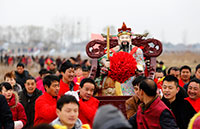Full Text: White Paper on Judicial Reform in China
(Xinhua) Updated: 2012-10-09 13:12I. Judicial System and Reform Process
The founding of the People's Republic of China in 1949 ushered in a new era for the building of China's judicial system. The Common Program of the Chinese People's Political Consultative Conference, which functioned as a provisional Constitution, and the Organic Law of the Central People's Government of the People's Republic of China, both promulgated in September 1949, laid the cornerstone for legal construction in New China. The Constitution of the People's Republic of China promulgated in 1954, the Organic Law of the People's Courts of the People's Republic of China, the Organic Law of the People's Procuratorates of the People's Republic of China among other laws and regulations, defined the organic system and basic functions of the people's courts and procuratorates, established the systems of collegiate panels, defense, public trial, people's jurors, legal supervision, civil mediation, putting into place the basic framework of China's judicial system.
Toward the end of 1950s, especially during the ten-year tumultuous "cultural revolution" (1966-1976), China's judicial system suffered severe damage. Since the reform and opening-up policies were introduced in 1978, China, after summing up its historical experience, established the fundamental policy of promoting socialist democracy and improving socialist legal construction, restored and rebuilt the judicial system, and formulated and amended a range of fundamental laws. In the 1990s, China established the fundamental principle of governing the country in accordance with the law, and quickened the step to build China into a socialist country under the rule of law. During the process of promoting social progress, democracy and the rule of law, China's judicial system is continuously improving and developing.
1. Basic Characteristics of China's Judicial System
China is a socialist country with a people's democratic dictatorship led by the working class and based on the alliance of workers and peasants. The people's congress system is the organic form of its state power. China's state system and system of government decide that its judicial power comes from the people, belongs to the people and serves the people. The people's courts and the people's procuratorates are created by the people's congresses at various levels, to which they are responsible and by which they are supervised.
The people's court is the basic judicial organ in China. The state has set up the Supreme People's Court, local people's courts at different levels and special people's courts such as military courts. They adjudicate civil, criminal and administrative cases in accordance with the law, and carry out law enforcement activities including the execution of civil and administrative cases and state compensation. The Supreme People's Court supervises the judicial work of all local people's courts and special people's courts. The people's court at a higher level supervises the judicial work of the people's court at the next lower level. In litigious activities, China adopts the systems of public trial, collegiate panels, challenge, people's jurors, defense, and judgment of the second instance as final, among others.
The people's procuratorate is the procuratorial organ in China. The state has set up the Supreme People's Procuratorate, local people's procuratorates at different levels and special people's procuratorates such as military procuratorates. The Supreme People's Procuratorate directs the work of local people's procuratorates at different levels and special people's procuratorates. A people's procuratorate at a higher level directs the work of a people's procuratorate at the next level below it. The people's procuratorate exercises legal supervision over criminal, civil and administrative litigations in accordance with the law.
The people's court and the people's procuratorate exercise their adjudicative power and procuratorial power independently and impartially in accordance with the law. Their exercise of power is subject to the supervision of the National People's Congress, the Chinese People's Political Consultative Conference and the general public.
The people's courts, the people's procuratorates and the organs of public security handle criminal cases according to their respective functions, and collaborate with and check each other, so as to ensure the accurate and efficient implementation of law. The organs of public security take charge of the investigation, detention, arrest and pretrial in criminal cases; the people's procuratorates conduct procuratorial work, approve proposals for arrest, investigate cases directly accepted by them, and initiate public prosecution; and the people's courts are responsible for conducting trials.
- China issues white paper on judicial reform
- Lawyers' rights guaranteed in China's judicial reform
- Grassroots judicial organs strengthened
- China establishes state compensation system
- China strictly controls death penalty
- White paper enumerates China's judicial reform goals
- More Chinese get free legal assistance
- 108 of 132 tasks fulfilled on judicial reform
- China improves systems of people's jurors
- WHO says list of free vaccines should be expanded
- Beheading of girl sparks death penalty debate in Taiwan
- Nations unite to fight border crime
- Cans of China's fresh air ready for sale
- China welcomes foreign talents in polar research
- Team set up to look into illegal sales of vaccines
- Big data helps university customize financial support to students
- Group seeks to broaden ties with Muslim world
- New KMT chief 'to remain on peaceful path'
- China terminates paid services in military







